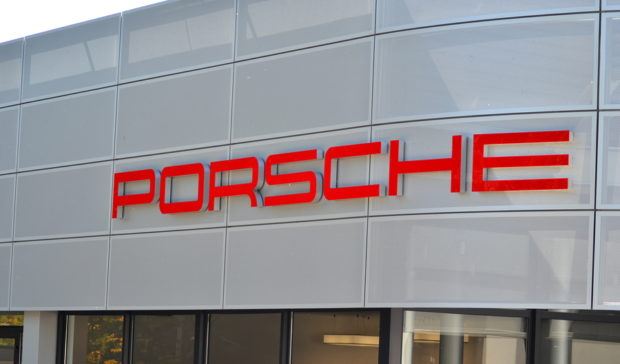Porsche Holding SE was dragged deeper into the Volkswagen AG emissions debacle as investors raced to file German lawsuits ahead of the one-year anniversary of the scandal.
A group of institutional investors filed a pair of lawsuits, seeking 2.8 billion euros ($2.5 billion) from VW and 2.2 billion euros from Porsche, Klaus Nieding, a lawyer for the plaintiffs, said Friday. Shareholders say both companies should have disclosed the problems sooner. Porsche, which is also publicly traded, owns the majority of VW shares.
Deutsche Asset Management, a unit of Deutsche Bank AG, will also sue to recover losses in the funds it manages, a person familiar with the issue said. Like other fund managers, the unit must pursue the claims as it could otherwise be liable to clients, according to the person, who asked not to be identified. Deutsche Bank’s press office declined to comment.
The cases are among thousands flooding a court in Braunschweig, Germany, as investors sue over VW’s admission that it rigged software on 11 million diesel vehicles to cheat on pollution tests. The German states of Hesse and Baden-Wuerttemberg as well as BlackRock Inc., the world’s largest money manager, were among the public and private entities joining the litigation.
Lawsuit Flood
“Stock investors have to accept there may be losses,” Hesse Finance Minister Thomas Schaefer said in a statement. “What we must not accept are losses caused by a corporation that violates disclosure rules. That’s what VW did.”
Investors are lining up to sue in Germany, where VW shares lost more than a third of their value in the first two trading days after the Sept. 18 disclosure of the scandal by U.S. regulators. Investors are rushing to court this week because they fear they have to sue within a year of the company’s admission.
Hesse, BlackRock, the German state of Bavaria and thousands of other shareholders claim that VW failed to properly disclose its actions in the probe. Employees installed computer software that detected when a car was on an emissions test stand and reduced pollution to allow the vehicle to pass inspections. When driven normally, the car emitted more pollution than permitted.
VW said in March that Chief Executive Officer Martin Winterkorn had received two memos informing him of discrepancies in U.S. diesel emissions in 2014 and participated in a meeting that touched on the matter in the summer of 2015, weeks before the scandal broke.
Management View
Management didn’t treat the matter with particular attention, according to the company. This may have been because a memo supplied in November 2014 put the cost of the diesel issues at about 20 million euros, not enough to grab the executives’ attention or fear a massive backlash from investors.
Nieding said he’s targeting Porsche because Winterkorn was also on the Porsche supervisory board when the scandal emerged. Other executives also served on boards of both companies, he said.
Porsche legally should be treated as knowing about the scandal because of the shared executives, and should have disclosed the matter, Nieding said.
Unfounded
Porsche spokesman Albrecht Bamler called the claims unfounded. Executives who serve on both boards are bound by secrecy rules and can’t disclose facts they learn from one company to the other, he said. The company is facing about 80 cases filed by smaller investors in a Stuttgart court. The first hearing is scheduled for Sept. 30.
Hesse said it lost 3.9 million euros when the scandal caused VW shares to drop from the EURO STOXX ESG Leaders 50, which the state’s investment managers were following. The exchange-traded fund provides access to companies that are global leaders in terms of environmental, social and governance.
BlackRock is the second-largest holder of VW’s preferred stock with a 3.35 percent stake after Qatar Holdings LLC, according to Bloomberg data. VW’s preference shares don’t carry voting rights.
“It’s regrettable that the state of Hesse decided to sue,” VW spokesman Eric Felber said in an e-mailed statement. The company always complied with capital-market disclosure rules, he said.
While the investor lawsuits pile up in Braunschweig, consumers affected by the scandal are focusing their efforts on Brussels. European Union Justice Commissioner Vera Jourova will meet with VW’s Francisco Javier Garcia Sanz on Sept. 21 as part of a campaign to persuade the company to offer car owners significant compensation. Currently, the company is only offering repairs to European customers whereas Americans got packages worth thousands of dollars.
Hand Forced
Hesse had to sue because of rules that force it to protect investors’ funds. The state asked VW to waive any statute of limitations so it could wait before suing, but the request was denied, Schaefer said.
More than 400 cases were registered in the Braunschweig court before the latest wave of lawsuits, according to Jan-Michael Seidel, the tribunal’s vice president.
Braunschweig is the legal district that includes the company’s headquarters. The lawsuits claim the leadership was aware as early as 2014 that U.S. authorities were probing test results and should have disclosed the investigation then. One lawsuit that’s been pending since March bundles claims of almost 300 institutional investors and seeks 3.3 billion euros.





















 Why Claims AI Build vs. Buy Decisions So Often Miss the Mark
Why Claims AI Build vs. Buy Decisions So Often Miss the Mark  Large Scale Cargo Ring Busted in LA, $5M Recovered
Large Scale Cargo Ring Busted in LA, $5M Recovered  Is Risk the Main Ingredient in Ultra-Processed Food?
Is Risk the Main Ingredient in Ultra-Processed Food?  AI Got Beat by Traditional Models in Forecasting NYC’s Blizzard
AI Got Beat by Traditional Models in Forecasting NYC’s Blizzard 









